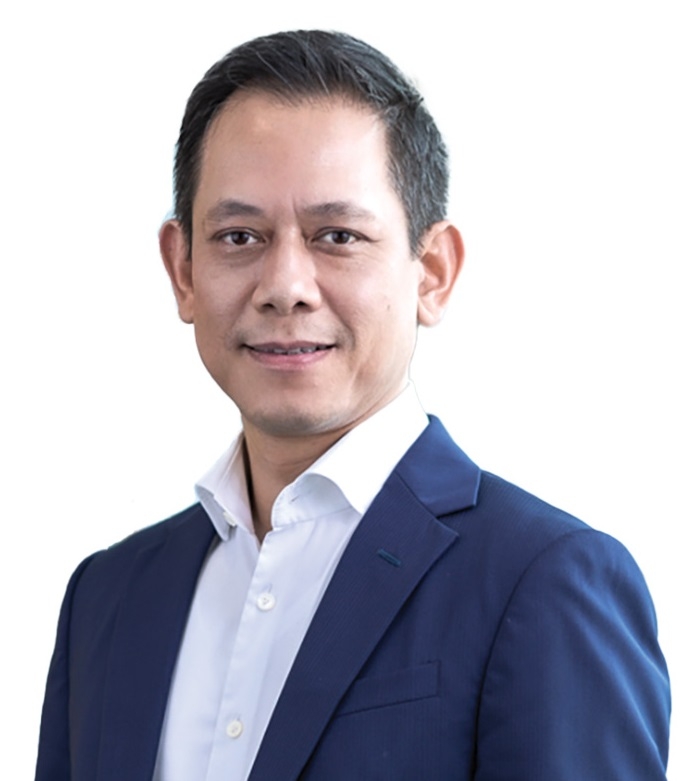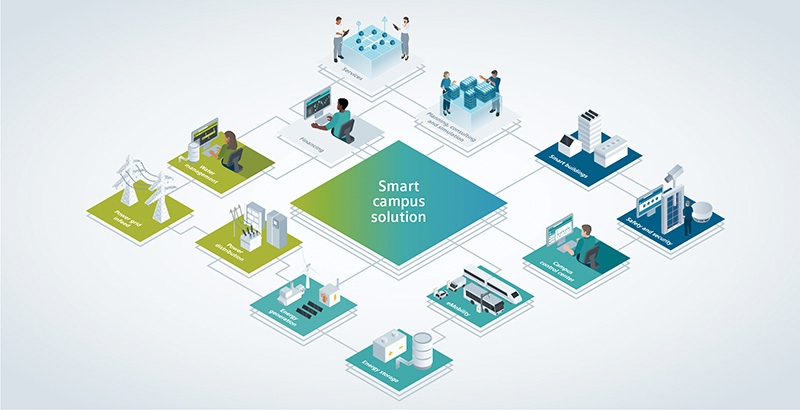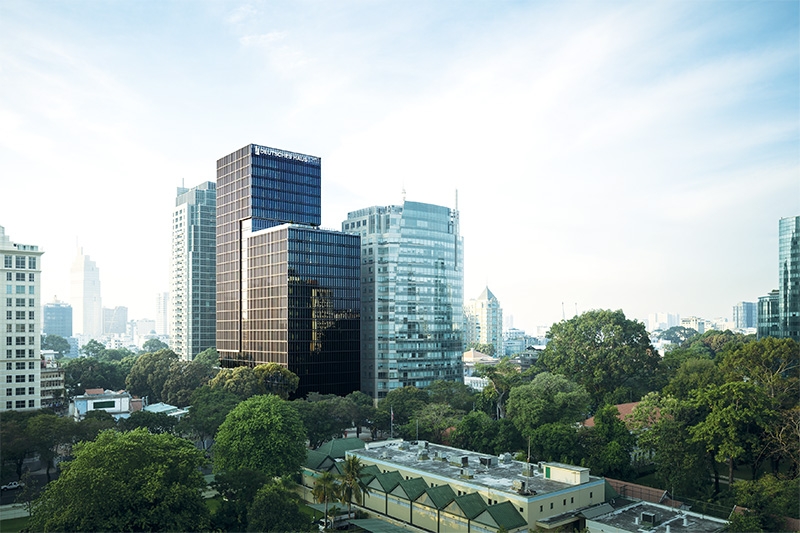Shaping the bright future of city life
What are the key challenges facing cities nowadays, and how do we address them?
 |
| Dr. Thai Lai Pham, CEO for Siemens ASEAN and Vietnam |
Population growth, climate change, ageing, and deteriorating basic infrastructure, resource scarcity, digitalisation, and changing needs and expectations all place demands on the operations of a city and create new challenges for cities to tackle.
At the same time, the vigorous development of cities through rapid urbanisation and economic growth also presents decision-makers and urban planners with enormous infrastructure challenges. Not only is it important to guarantee a high quality of life for city dwellers but also to ensure that metropolises remain economically competitive and that resources are handled responsibly. Last but not least, pandemics such as COVID-19 demand a safe and healthy environment to protect the wellbeing of and concurrently provide the highest individual flexibility.
The only way to cope with these challenges is for cities to become smarter. Smart city solutions contribute to the effective management of urban areas, improving connectivity, sustainability, and livability as well as boosting their resilience. Across all areas of city life, technology and data are used to analyse and optimise, thus enhance outcomes.
What are the prerequisites for cities to become smarter?
One important factor is digitally-enabled smart infrastructure such as smart spaces, smart grids, or smart mobility, which are based on a foundation of electrification and automation to drive efficiencies in services through the optimisation of operations and equipment, changing operational patterns based on demand, and managing and maintaining the systems remotely. Mobility solutions increase the availability of infrastructure, optimise throughput, and create a new quality of passenger experience through digitalisation.
For instance, the Digital Railway provides a new opportunity for cities and train operators to run railways that are interactive and self-managing, and at the same time provides passengers with a new level of connectivity besides convenience and comfort when moving around. The Smart Grid, meanwhile, provides an optimised balance of generation and demand, reducing the overall consumption of electricity in development by directly regulating devices or influencing consumer behaviour.
Smart building tech will help cities achieve the highest standards of environmental efficiency and reduce energy demands. Smart buildings adapt to the needs of people and businesses within them by increasing comfort, efficiency, resiliency, and safety. And today there is a new need: to protect people from COVID-19.
 |
Smart city campus is a topic attracting more and more attention these days. Some even say that they are shaping the future of how we live and work. How does that take place?
Smart city campus is shaping the future of city life. It tackles many of the challenges that cities face today. It uses smart infrastructure to shape the lives of people and communities, the success of businesses, and the health of the world around it. It manages costs and uses resources efficiently. It is adaptable to changing demands. It makes life and work easier, and helps to create more caring environments.
A campus is an environment that consists of the buildings, land, and facilities of an organisation contained in one clearly defined area. This could be a college or university, a large factory site, a business park, an exhibition or sports park, an urban area, or a city district. For example, a city and its surroundings usually contain many campuses - some connected and some isolated.
There are three types of campuses: cities and urban areas, higher education facilities, and mixed-use campuses where industrial use sits alongside leisure, retail, and living. Smart campuses help to create cities that are attractive for people to move to and where companies want to be and where people want to work. They create places that are healthy and liveable by ensuring the environments are unpolluted and air quality is good. They ensure the energy supply is resilient and provide flexibility for growth and change and, more importantly, they create a thriving ecosystem attracting investment.
A well-designed campus adds huge value to universities. It creates the perfect conditions for learning and living, and it supports the sharing of knowledge and collaborative working. It creates the flexibility necessary for change and innovation. Ultimately it helps to make the institution more attractive and reinforces its brand and reputation. Smart campuses are also important for individuals because they support their respective way of life, adjust to their changing needs, and make their life better and more enjoyable.
For communities, smart campuses create desirable and valuable places to live and work, and they allow for the maximum use of renewable resources and support sustainability.
Smart campuses also offer a lot of benefits for industry, such as reducing costs, maximising productivity by ensuring people are comfortable and happy, maximising the efficient use of energy, and creating flexibility to respond to opportunities.
What are some of the outstanding city campus projects Siemens has participated in recently?
We are harnessing technology, our expertise, and our experience in managing complex projects to create healthy, responsible, and liveable campuses - from mixed-use sites to districts and cities and from universities to industries. We use our knowledge and understanding of technology, buildings, and energy to enhance building performance and mobility and to create a new decentralised and low carbon energy landscape.
As a result, we create environments that understand and manage changing conditions, that support and care for the people who use them, and that make lives better. We help create environments that use resources more carefully and that care for the planet.
Together with partners such as the city of Vienna in Austria, Siemens has been carrying out one of Europe’s most innovative and sustainable energy efficiency demonstration projects: the 240-hectare “Aspern - Vienna’s Urban Lakeside”. Siemens is working on the digitalisation of infrastructure, increasing energy efficiency in both power grids and buildings, as well as linking buildings to the power supply in Seestadt Aspern.
Based on customer requirements, Siemens develops applications such as smart maintenance to support the operations, maintenance, and services of a building or smart charging to enable improved integration of charging infrastructure into buildings the distribution network, as well as to accelerate e-mobility. Thanks to the strong involvement of Siemens, Seestadt Aspern stands out today as a globally recognised smart city role model, and it was honoured with the World Smart City Award in 2016.
Meanwhile, over a total area of over 120,000 sq.m and with almost 4,000 beds and more than 130 surgical theatres, Ankara City Hospital in Turkey is one of the largest and most modern hospital campuses in the world. It is an intelligent ecosystem that offers patients and staff utmost comfort and safety while focusing on being highly sustainable and efficient. Siemens’ Desigo CC building management platform has supported the seamless integration and central control of 22 hospital sub-systems through monitoring and controlling almost 800,000 data points, thus enabling critical infrastructure to run smoothly, day and night.
For smooth network operation, the hospital is equipped with the latest energy automation tech and system provided by Siemens. The hospital also employs Siemens Siveillance Suite to ensure a safe environment for patients, staff, and visitors. Many of these solutions have been deployed extensively in Vietnam. Desigo CC supported the Deutsches Haus to become the most sustainable office building in Vietnam, while in terms of smart grid, Siemens’ most advanced technology in the power distribution industry is helping Ho Chi Minh City remarkably improve the efficiency and reliability of the distribution network in 21 cities and provinces in Vietnam’s southern region.
Siemens has a unique digital offering for the infrastructure needs of a city. With our profound experience and well-proven track record worldwide, we are looking forward to working with local Vietnamese authorities and businesses to establish many more smart city campuses in the country, thus making cities become smarter and more liveable.
 |
| German House - one of the most sustainable and modern office buildings in Vietnam supported by Siemens technology. Photo: Deutsches Haus |
What the stars mean:
★ Poor ★ ★ Promising ★★★ Good ★★★★ Very good ★★★★★ Exceptional
 Tag:
Tag:
Themes: Digital Transformation
- Dassault Systèmes and Nvidia to build platform powering virtual twins
- Sci-tech sector sees January revenue growth of 23 per cent
- Advanced semiconductor testing and packaging plant to become operational in 2027
- BIM and ISO 19650 seen as key to improving project efficiency
- Viettel starts construction of semiconductor chip production plant
Related Contents
Latest News
More News
- Inside Lego Manufacturing Vietnam (December 18, 2025 | 11:45)
- The next leap in Cloud AI (December 11, 2025 | 18:19)
- Vietnam’s telecom industry: the next stage of growth (December 11, 2025 | 18:18)
- Five tech predictions for 2026 and beyond: new era of AI (December 11, 2025 | 18:16)
- CONINCO announces new chairman and CEO (December 10, 2025 | 11:00)
- How AWS is powering the next-gen data era (December 09, 2025 | 13:14)
- Outlook in M&A solid for Singapore (December 08, 2025 | 10:31)
- Vietnamese firms are resetting their strategy for global markets (December 05, 2025 | 17:04)
- LPBank Securities accelerates AI and data innovation with AWS (December 05, 2025 | 09:00)
- Improving traceability capacity with Zebra Technologies (November 26, 2025 | 10:08)






















 Mobile Version
Mobile Version